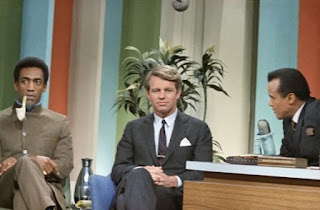 |
| Image Source: Pinterest |
Television made Donald Trump president. The master of The Apprentice created a character named “Donald Trump”—a tough but fair business genius—and sold him to the country. That character, so different from the man who declared six business bankruptcies and stiffed his contractors, then grabbed the microphone to opine about politics. As he spouted nonsense about President Obama’s birth certificate, television fell for him again, featuring him on cable shows well after his claim had been proven an early case of fake news. And this addiction continued throughout Trump’s long-shot presidential campaign, as he spewed hate—and pumped up network ratings. CBS’s Leslie Moonves will go down in history for admitting that “It may not be good for America, but it’s damn good for CBS…. The money’s rolling in.” He continued: “It’s a terrible thing to say, but bring it on, Donald. Go ahead. Keep going.”
When the old folks say television used to be different from the profit-driven, ratings-obsessed, news-as-entertainment industry of today, they don’t always have good counterexamples. But a few years back, I came across a perfect one: the week in February 1968 when, at the height of the Vietnam War’s Tet offensive, as riots were wracking major American cities and the Democratic Party was coming apart, Johnny Carson handed The Tonight Show over to the legendary Harry Belafonte, who proceeded to use the platform to introduce white America to his world of art and activism.
The week featured Belafonte’s searing, in-depth interviews with Robert F. Kennedy and Martin Luther King Jr., just months before both were assassinated. Even before their deaths, America had begun to unravel. Big, bold changes like the Civil Rights and Voting Rights Acts still left black Americans behind economically, while whites were convinced they’d done enough. The most innovative efforts in the War on Poverty were already winding down, a casualty of white backlash and ballooning spending on the Vietnam War. Richard Nixon loomed ominously on the horizon. In conversation with Belafonte, King and Kennedy come across as thoughtful, admirable, heroic—but also battered and shaken. They don’t have the answers.
Comments